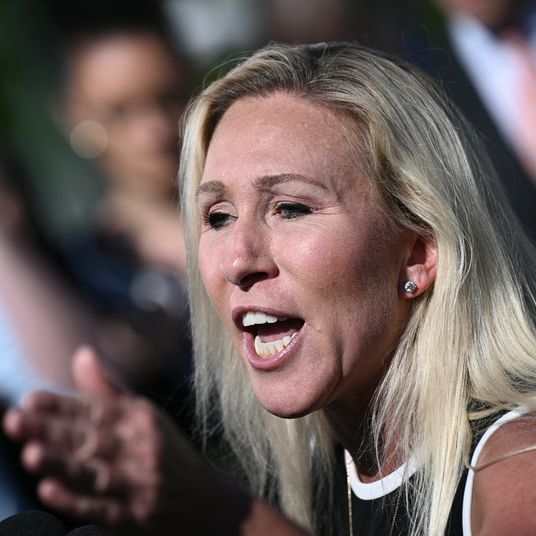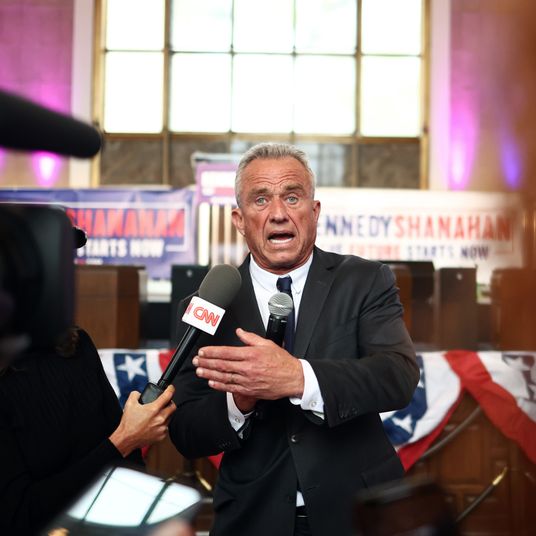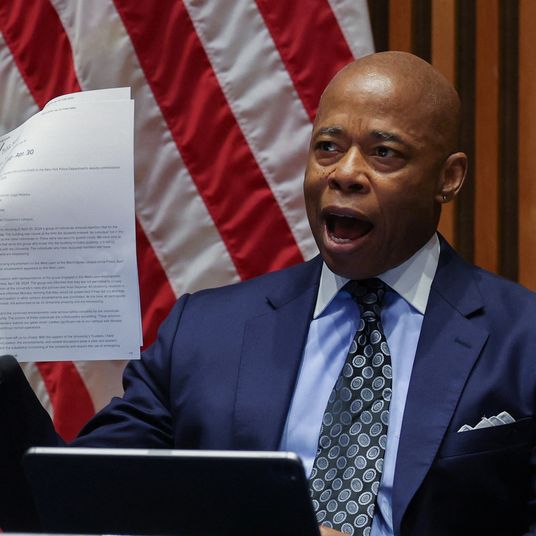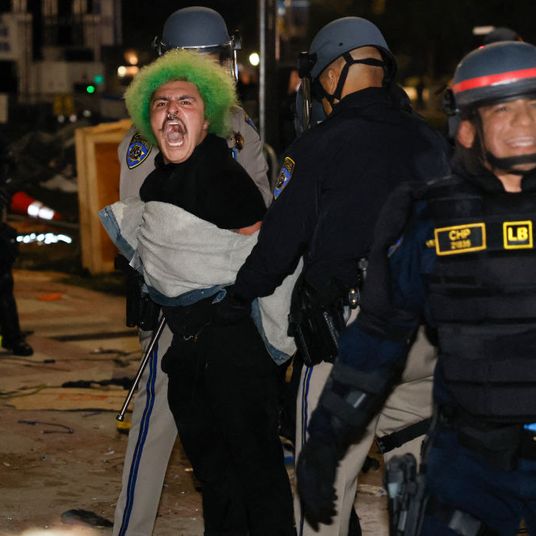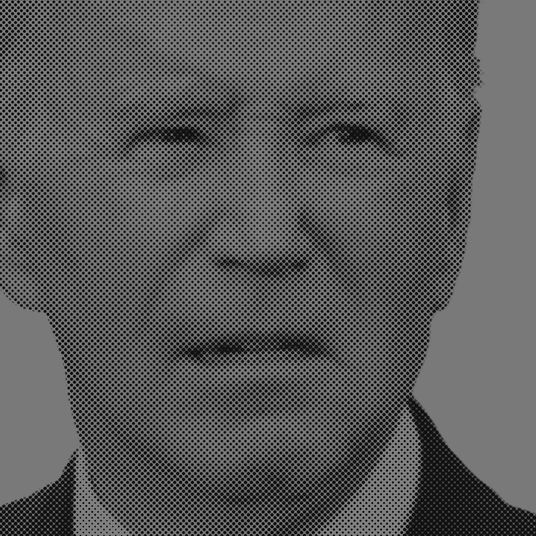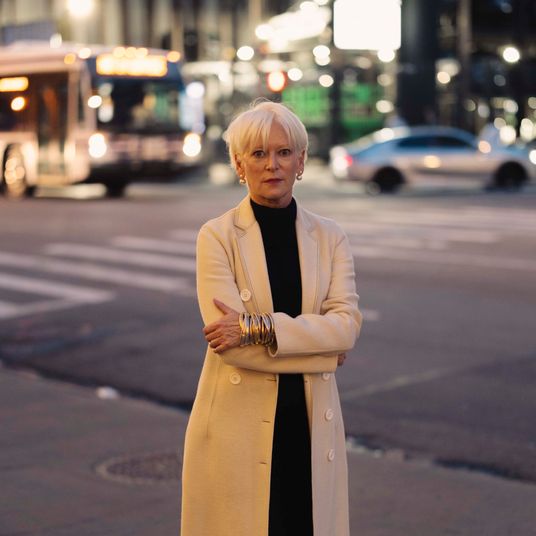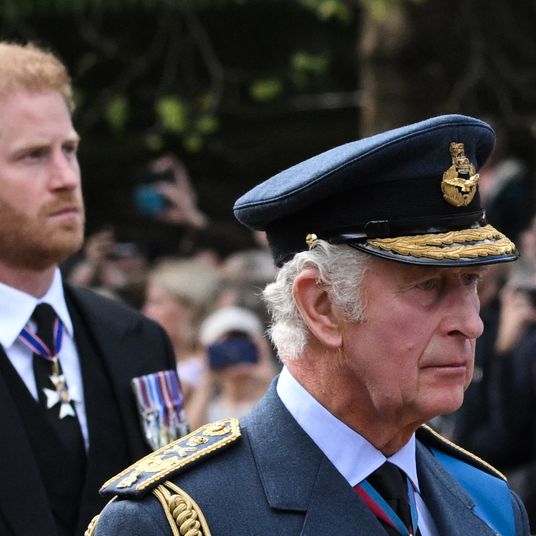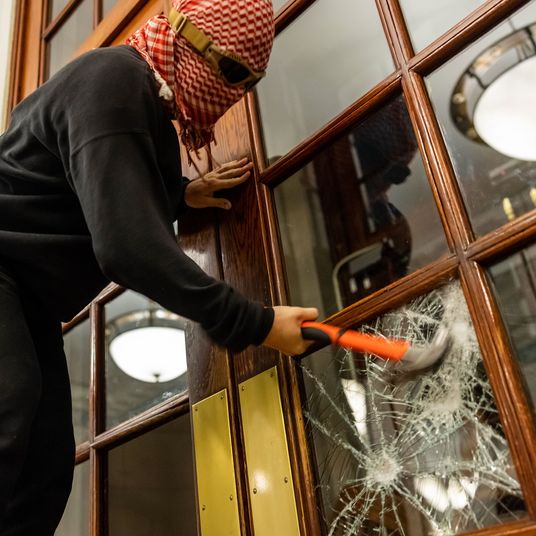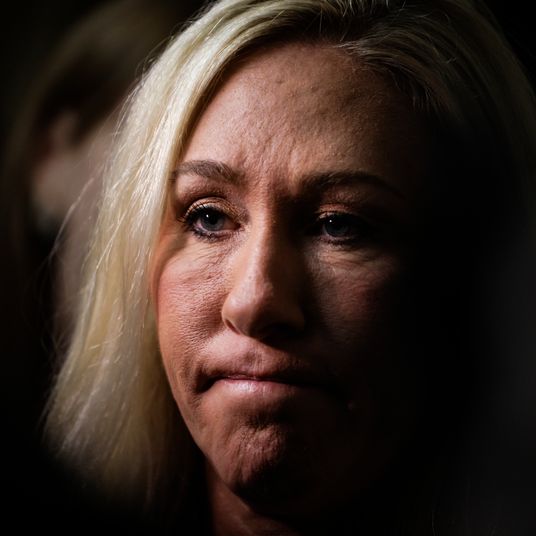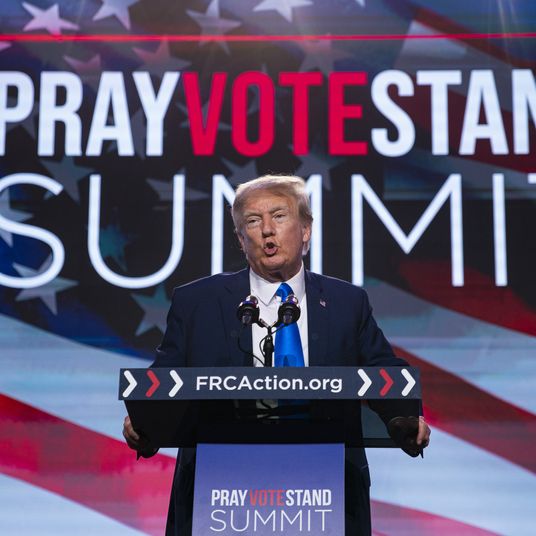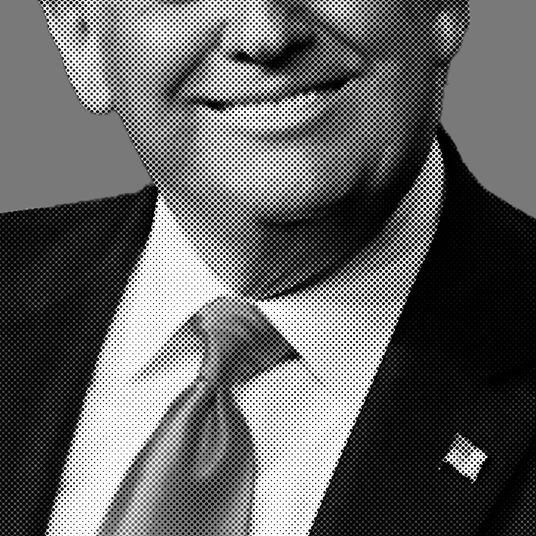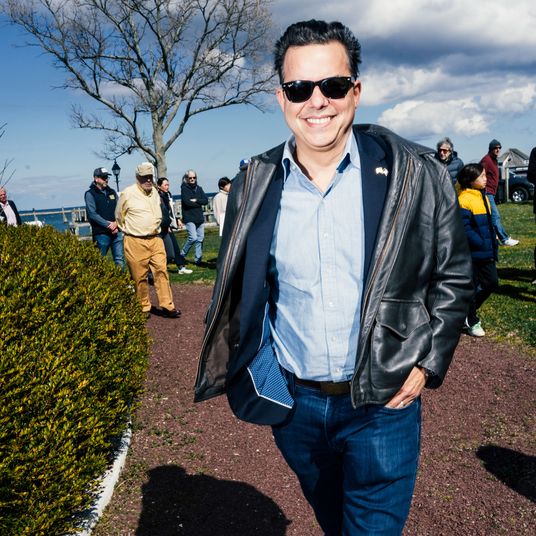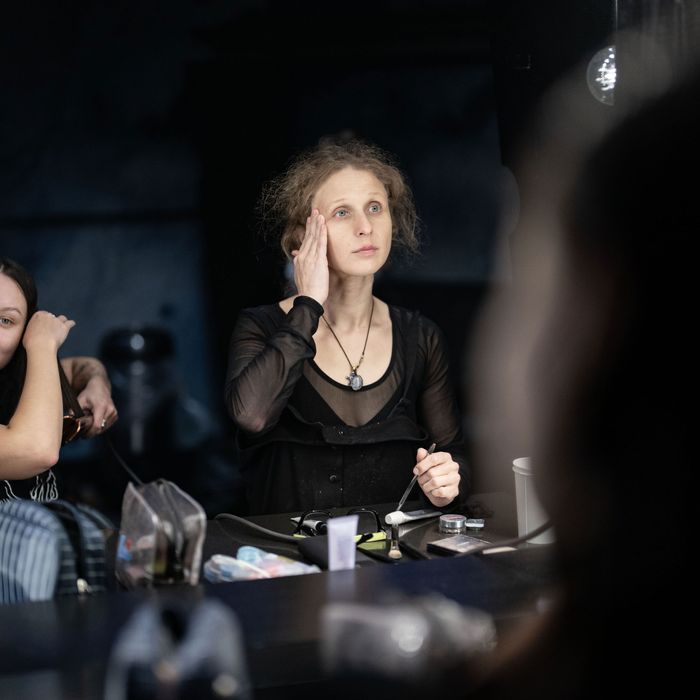
This article was featured in One Great Story, New York’s reading recommendation newsletter. Sign up here to get it nightly.
For Pussy Riot, the revolution will be fought with pancakes. And butter pecan–flavored syrup, eggs, creamer, and “Sir, please more coffee!” Lots of water, too, but “No ice!” The Russian dissidents were soothing their voices and refueling at an IHOP in the Boston suburbs last Wednesday after yelling all night during their punk rock play, Riot Days. After two months on the road on their first American tour, they need all the energy they can muster for a final show in Brooklyn to tell the world that Vladimir Putin is a dictator and war criminal who must be stopped.
That is a dangerous thing for any Russian to say, home or abroad, but they are not scared. They are way more concerned about beating rush-hour traffic than getting hunted by Putin’s agents.
“Have you seen our schedule?!” asks founding member Maria Alyokhina, huffing a strawberry kiwi vape, who also goes by Masha.
“There’s no time for poisoning!” says her bandmate Olga Borisova with a laugh.
That risk hasn’t stopped Pussy Riot, a feminist art collective, from staging provocative stunts against the Kremlin for over a decade, but the regime is far less tolerant of dissent since Russia invaded Ukraine. Suddenly, spreading what the government deemed “fake” information about the war — even calling it a “war,” rather than the state-sanctioned “special military operation” — became a crime punishable by up to 15 years in prison. Independent media inside Russia evaporated. One by one, most of Pussy Riot fled the country. (The touring members are part of the broader collective.) Masha, who was already under house arrest for promoting a protest, escaped to Lithuania last May disguised as a food courier. (There is now a warrant out for her arrest.) She received citizenship from Iceland but has no permanent home, choosing to live as a nomad. With Russian civil society all but crushed, Pussy Riot now operates almost entirely abroad, imploring the West to keep supporting Ukraine in its war against Russia and stand against authoritarianism.
“This story can happen anywhere,” says Masha. “This is not just a war in Ukraine.”
The Riot Days show is adapted from Masha’s memoir of the same name, which chronicles her detention at a penal colony following Pussy Riot’s infamous “punk prayer.” In February 2012, five women dressed in colorful dresses and balaclavas staged a surprise performance in Moscow’s Cathedral of Christ the Savior calling out the corruption between the Russian Orthodox Church and Putin. Up until this point, the group had been anonymous, but when authorities arrested three of the five participants, they became the faces of Pussy Riot: Masha, Nadya Tolokonnikova, and Katya Samutsevich, who at the time were 24, 22, and 30, respectively.
In a show trial reminiscent of the Soviet era, all three were charged with “hooliganism motivated by religious hatred” and sentenced to two years in a penal colony. (Katya was released after being given a suspended sentence and has since largely disappeared from the public eye.) Despite isolation, abuse, freezing temperatures, and weekly gynecological exams, Masha raised hell in prison, staging several hunger strikes and legal battles for prisoners’ rights. She got several guards dismissed and won higher wages, fair work hours, and shawls for the inmates.
Their imprisonment sparked international outcry. Putin freed them a few months before hosting the 2014 Winter Olympics in Sochi. Masha and Nadya emerged from prison emboldened and founded Mediazona, an independent news outlet, and Zona Prava, an advocacy group for prisoners’ rights. But Putin’s repression only worsened. Two months after their release, Masha and Nadya were flogged by police after they staged another protest outside the Olympics. Later, a group of men attacked them with green antiseptic, pepper spray, and metal bins, giving them chemical burns and head injuries. Still, Pussy Riot remained undeterred: In 2018, four members of Pussy Riot stormed the field of the World Cup final in Moscow dressed as police officers. Two months later, one of them, Pyotr Verzilov, the father of Nadya’s child, was poisoned. Masha moved her son abroad after the FSB visited his father. Between the summer of 2021 and the full-scale invasion of Ukraine, Masha did six stints in jail for 15 days each. Since Pussy Riot fled, freedom in Russia has deteriorated further. Earlier this month, police raided gay bars after the country’s high court labeled LGBTQ+ activism, a key component of Pussy Riot, as “extremist.” At the IHOP, Masha predicted feminists would be next.
In the parking lot, Pussy Riot loads into a black sprinter van littered with pistachio shells and speeds toward New York, reporting cops on Waze along the way (they have a gold star). Barren trees give way to nondescript plazas on the edge of the city. Masha, sitting in the front seat, puts on “A Wolf at the Door” by Radiohead.
“We’re not depressed enough,” says Olga from the first row.
“It’s not depressing!” says Masha. “It’s one of my favorite albums.”
“Okay, how does this contradict my statement?” says Olga.
Olga, who left Russia after the invasion, curls up against the window and stares at a stream of red brake lights idling on the highway. “Always in traffic I feel like I’m just driving with my parents, and I’m a kid in the back seat and feel so sleepy with all those lights. ‘Are we home?!’ ‘Not yet.’ ‘Okay,’” she mutters. “There is no home.”
Lucy Shtein, Masha’s girlfriend, was also placed under house arrest for promoting a protest and escaped by dressing as a food courier. In the van, she announces that she got a notification with a scheduling update about her second criminal case — charged with tweeting that Russia was bombing Ukraine, which carries a penalty of between five and ten years in prison. Olga perks up. “Oh, right!” says Olga. “You have a new one!”
“‘You are pregnant!’” says Lucy, laughing at Olga’s excitement.
For most members of Pussy Riot, those are the options: Flee or return and be imprisoned, just as opposition candidate Alexei Navalny decided to do following treatment in Germany for poisoning by the FSB. (Navalny’s attorneys reported this week he has gone missing while behind bars.) At this point, with already more than 600 political prisoners in Russia, jail would be a sacrifice of questionable value and enormous personal cost that many Pussy Riot members are not prepared to make.
“I’ve been there. It’s fucked,” says Nadya from an undisclosed location. “I’m still dealing with so many mental-health issues because of that and having panic attacks.” The founder of Pussy Riot, who also left Russia, works abroad on her own projects with the collective, such as a recent abortion protest at the Indiana statehouse. (Last month, Russian authorities issued a warrant for her arrest.)
Masha has not ruled out returning home. “Life is unpredictable,” she says. But for the time being, she and others feel they can achieve more by fighting abroad. Still, effective dissidence outside of Russia is difficult. Even while Pussy Riot was active in the country, their work drew little popular support. During their trial, Western media celebrated Pussy Riot as brave dissidents, while Russian state media lambasted them as God-hating, Western operatives. Now that Pussy Riot is mostly functioning away from Russia, the opportunity to directly confront its authoritarian system — like hanging pride flags from official buildings for Putin’s birthday — is virtually impossible. Working and living abroad is the least awful choice before them and one that at least allows for some possibility and hope. “We don’t have tanks. We don’t have weapons, but we have our hearts and we have our brains,” says Masha. “If we count after every step how effective it is, we will just stand in one place and not move anywhere.”
Since fleeing Russia, they’ve been at constant work. As soon as Masha escaped, the band began touring Riot Days throughout Europe, raising money for a children’s hospital in Ukraine, and made several antiwar videos. A Pussy Riot retrospective is circulating through international museums. Nadya raised nearly $7 million for Ukraine’s military with an NFT. After burning down a giant portrait of Putin, Nadya collected the remains in vials and mounted them in a multimedia exhibition called “Putin’s Ashes,” now on display at the Dallas Contemporary. After the tour, part of the band will head to D.C. to discuss human rights in Russia with members of Congress. Masha wants to write a second book, and is even considering joining the armed forces in Ukraine.
“I don’t want anyone to feel what we are all feeling now,” says Masha. “We still open the phone in the morning and we see dead bodies. And this is every day.”
A few nights later, in the dressing room of the Warsaw in Greenpoint, Masha slips fishnets over her right foot and weaves them through the ankle monitor she kept from house arrest. She slips the tights over her left foot, tattooed with a verse from the Gospel of John: “The light shines in the darkness, and the darkness has not overcome it.” She puts on clunky leather sneakers laced with paper towels, just how she used to tie them in prison. She sighs into her tea cup. More Red Bull arrives. Vape smoke fumes out of her nose. She grabs a white balaclava and marches downstairs for one final show of Riot Days.
The ballroom is dark. Alina Petrova strums a ballad on the electric violin. Diana Burkot, who escaped arrest during the 2012 “punk prayer” in Moscow, emerges on the controller and punk blasts from the speakers. Olga and Masha stride onstage in balaclavas. For the next hour, Pussy Riot plays out, in Russian, Masha’s journey through prison and the absurdity of contemporary Russian politics against a video montage with English subtitles. In one chapter, they squat in formation for body searches. In another, Olga simulates masturbating while they all moan, “Lukashenkooooo!” to ridicule Putin’s cozy relationship with the authoritarian leader of Belarus. Olga sprays the audience of 700 people with water as the story moves to the penal colony, where Masha’s blood pressure plummets during a hunger strike. Later, the women yell, “Look! Look!” as the faces of political prisoners in Russia flash onscreen for over a minute:
Svetlana Petriychuk.
Alexei Moskalev.
Evan Gershkovich.
Oleg Belousev.
Mikhail Simonov.
Vladimir Rumyantsev.
Salekh Magamadov.
In the end, a video shows bombs raining down on Ukraine and body bags piling up in trucks. “We stand against this fucking war!” yells Masha into the microphone. “You have elections next year. Don’t give your country to the assholes!” The crowd cheers. The band recedes offstage. The tour is over, but Pussy Riot is staying on the road.









